The Israeli military confirmed on Wednesday it carried out the 2007 airstrike in Syria that destroyed what was believed to be a nuclear reactor, lifting the veil of secrecy over one of its most daring and mysterious operations in recent memory.
Although Israel was widely believed to have been behind the Sept. 6, 2007, airstrike, it has never before commented publicly on it.
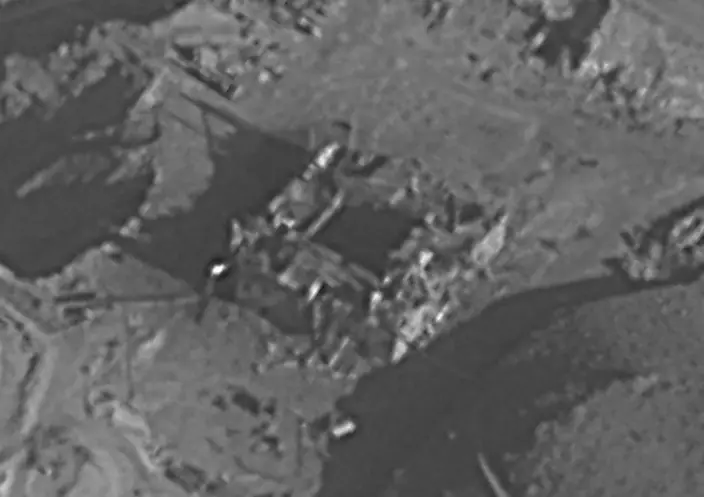
This photo released by the Israel Defense Forces shows what was believed to be a nuclear reactor site that was destroyed by Israel, in the Deir el-Zour region, 450 kilometers (about 300 miles) northwest of Damascus, Syria. The Israeli military confirmed Wednesday that it carried out the 2007 airstrike in Syria that destroyed what was believed to be a nuclear reactor, lifting the veil of secrecy over one of its most daring and mysterious operations in recent memory. (IDF via AP)
In a lengthy release, the military revealed that eight F-15 fighter jets carried out the top-secret airstrikes against the facility in the Deir el-Zour region, 450 kilometers (about 300 miles) northeast of Damascus, destroying a site that had been in development for years and was scheduled to go into operation at the end of that year.
Israel's involvement has been one of its most closely held secrets, and it was not immediately clear why Israel decided to go public now. The military would not comment on its reasoning, but the move could be related to the upcoming memoir of former Prime Minister Ehud Olmert, who ordered the strike and has hinted about it for years. It could also be meant as a warning to archenemy Iran, which is deeply involved in Syria's conflict.
"The motivation of our enemies has grown in recent years, but so too the might of the Israeli military," Defense Minister Avigdor Lieberman said Wednesday. "Everyone in the Middle East would do well to internalize this equation."
Israel and Syria have always been bitter enemies. Throughout Syria's seven-year civil war, Israel has carried out well over 100 airstrikes, most believed to have been aimed at suspected weapons shipments destined for the Iranian-backed Hezbollah militant group. Both Iran and Hezbollah are allied with Syrian President Bashar Assad.
At the time of the 2007 strike, Syria accused Israel of invading its airspace, but gave no further details about the target.
The pre-mission briefing, made public Wednesday, stated that the operation should not be attributed to Israel so as to minimize the potential for an all-out war.
The Syria strike was reminiscent of an Israeli attack in 1981 against a reactor being built in Iraq. That strike was later credited with preventing Saddam Hussein from acquiring weapons of mass destruction that could have been used in the Gulf War a decade later.
"The message from the 2007 attack on the reactor is that Israel will not tolerate construction that can pose an existential threat," military chief Lt. Gen. Gadi Eisenkot said in Wednesday's statement. "This was the message in 1981, this is the message in 2007 and this is the future message to our enemies."
Eisenkot, who at the time commanded Israel's northern front along the Lebanese and Syrian borders, said it marked Israel's most comprehensive attack in Syria since the 1973 Mideast war, and that everyone involved knew it could spark a new one. He said only a handful of top commanders were aware of the plans for Operation "Outside The Box."
The military said the F-15s took off from two bases in southern Israel at 10:30 p.m. on Sept. 5, and returned four hours later.
Wednesday's announcement also indicated the Syrian reactor was much closer to completion than previously reported.
From Israel's perspective, the strike was an astounding success since it not only destroyed the site, but prevented further escalation and strengthened its deterrence in the region.
Air force commander Maj. Gen. Amikam Norkin said the current turmoil in Syria has further vindicated the strike, particularly since the reactor was in an area later captured by Islamic State militants.
"Imagine what situation we would be in today if there was a nuclear reactor in Syria," Norkin said. "Israel's decision to destroy the reactor is one of the most important decisions taken here in the last 70 years."
Uzi Rabi, an expert on Iran at Tel Aviv University, said Israel's surprising confirmation might be meant as a "warning sign" to Iran as it expands its military footprint in Syria. Israel has warned against the establishment of a permanent Iranian military presence in Syria, particularly in areas close to Israel.
Tzipi Livni, who was foreign minister at the time of the strike, told The Associated Press that in discussions after Israel discovered the reactor, "we asked ourselves whether Israel can, or is, willing to live with this."
"The answer was 'no' then, the answer is 'no' now," she said.
Last month, Israel shot down an Iranian drone that entered its airspace, triggering a clash in which an Israeli warplane crashed after being struck by Syrian anti-aircraft fire. Israel responded by bombing Syrian anti-aircraft batteries.
In Wednesday's statement, the military said it began obtaining information regarding foreign experts helping Syria develop the Deir el-Zour site in late 2004. Later, it discovered that North Korea was helping Syria build a reactor to manufacture plutonium.
In his memoir, "Decision Points," former President George W. Bush said Israel first asked the United States to bomb the site, and then carried out an attack itself when Washington declined.
The strike came about a year after Israel's inconclusive war against Hezbollah, in which the Lebanese guerrillas battled Israel's army to a stalemate. The poor performance raised questions about Israel's deterrent capabilities.
"Prime Minister Olmert's execution of the strike made up for the confidence I had lost in the Israelis during the Lebanon war," Bush wrote, adding that the Israeli leader rejected a suggestion to go public with the operation.
"Olmert told me he wanted total secrecy. He wanted to avoid anything that might back Syria into a corner and force Assad to retaliate. This was his operation, and I felt an obligation to respect his wishes," Bush wrote.
Olmert has skirted around the issue, and military censors, for years, repeatedly saying that according to foreign sources Israel had been involved. After Bush's account was published in 2010, Olmert said: "I don't want (to), and I can't deny it."
Olmert, who was prime minister from 2006 until 2009 and was recently released from prison after serving time for corruption, is expected to delve more deeply into the issue in his upcoming book. The disclosure looks to help rehabilitate at least part of Olmert's tarnished image while damaging the legacy of his longtime rival, then-Defense Minister Ehud Barak, who was reportedly hesitant to strike in Syria.
JERUSALEM (AP) — Israel and Iran on Friday both played down an apparent Israeli airstrike near a major air base and nuclear site in central Iran, signaling the two bitter enemies are ready to prevent their latest eruption of violence from escalating into a full-blown regional war.
But the indecisive outcome of weeks of tensions — which included an alleged Israeli strike that killed two Iranian generals, an unprecedented Iranian missile barrage on Israel and the apparent Israeli strike early Friday in the heart of Iran — did little to resolve the deeper grievances between the foes and left the door open to further fighting.
“It appears we’re closer than ever to a broad regional war, despite the fact that the international community will most likely make a great effort to de-escalate tensions,” wrote Amos Harel, the military-affairs commentator for the Israeli daily Haaretz.
Israel has long considered Iran to be its greatest enemy — citing the Islamic Republic’s calls for Israel’s destruction, its controversial nuclear program and its support for hostile proxies across the Middle East.
These tensions have risen since Hamas and Islamic Jihad, Iranian-backed Palestinian groups, attacked Israel on Oct. 7, sparking a devastating Israeli offensive in Gaza that has continued for more than six months. Hezbollah, an Iranian-backed proxy in Lebanon, immediately began striking Israeli targets, opening up tit-for-tat fighting along a second front, while Iranian-backed militias in Iraq, Syria and Yemen have also fired missiles and drones at Israel throughout the war.
While Israel and Iran have waged a shadow war for years, mostly in neighboring Syria, they have largely avoided direct confrontations. That changed after an April 1 airstrike killed two Iranian generals at an Iranian diplomatic compound in the Syrian capital of Damascus. Although Israel did not comment, Iran blamed Israel for the strike and vowed revenge.
Iran responded with its first-ever direct attack on Israel, launching over 300 missiles and attack drones late Saturday night. Israel, working with a U.S.-led international coalition, said it intercepted 99% of the incoming fire, though a handful of missiles managed to land, causing minor damage to an Israeli military base and seriously wounding a young girl.
In Friday’s attack, Iranian state television said that air defense batteries fired in several provinces over reports of drones in the air. Iranian army commander Gen. Abdolrahim Mousavi said crews targeted several flying objects.
“The explosion this morning in the sky of Isfahan was related to the shooting of air defense systems at a suspicious object that did not cause any damage,” Mousavi said.
Authorities said air defenses fired at a major air base near Isfahan, which long has been home to Iran’s fleet of American-made F-14 Tomcats — purchased before the 1979 Islamic Revolution.
Isfahan also is home to sites associated with Iran’s nuclear program, including its underground Natanz enrichment site, which has been repeatedly targeted by suspected Israeli sabotage attacks. The apparent attack Friday came on Iranian Supreme Leader Ayatollah Ali Khamenei’s 85th birthday.
State television described all Iranian atomic sites in the areas as “fully safe.” The United Nations’ nuclear watchdog, the International Atomic Energy Agency, also said there was “no damage” to Iran’s nuclear sites.
Iranian officials made no mention of possible Israeli involvement. That could be intentional, particularly after Iranian officials for days have been threatening to respond to any Israeli retaliatory attack.
Israel also had no comment on the apparent attack, though one hard-line government minister, Itamar Ben-Gvir, hinted at his dissatisfaction, with a one-word tweet early Friday, using a slang word for weak or lame.
But Italy’s foreign minister, Antonio Tajani, said at a summit of Western leaders in Capri that the U.S. received “last-minute” information from Israel about the attack. U.S. Secretary of State Antony Blinken did not dispute that, but said: “We were not involved in any offensive operations.”
Yoel Guzansky, a former Iran expert in the Israeli prime minister’s office, said Israel appears to have carried out the attack to “check off a box” by sending a message to Iran without doing anything too provocative that could upset the United States, which had urged restraint, or spark further Iranian retaliation.
“It seems very limited, to send a message that ‘we can strike you inside of Iran,’” said Guzansky a senior researcher at the Institute for National Security Studies, a Tel Aviv think tank.
He said “the current round” of violence appears to be over, but that “nothing has changed” with Israel still facing Iranian-backed threats on various fronts.
“I see further rounds,” he said. And the next time, if Iran surprises Israel or allies don’t assist in Israel’s defense, “the outcome will be different.”
U.N. Secretary-General Antonio Gueterres called for an end to the strikes.
“It is high time to stop the dangerous cycle of retaliation in the Middle East,” his office said.
Charles Lister, a senior fellow at the Washington-based Middle East Institute and a longtime regional analyst, challenged Iran’s claims that drones carried out the attacks. It appears instead that a small number of Israeli aircraft flew from Israel over Syria — striking at least two southern Syria military bases that have air defense systems along the way, he said.
They then entered Iraqi airspace, from where they fired a small number of Blue Sparrow air-to-surface ballistic missiles, likely without ever entering Iranian airspace, Lister said.
Accounts of explosions over Iraq support that scenario, and so does debris from what appears to be the booster of an Israeli-made Blue Sparrow missile that Iraqi security found in a field outside Baghdad, Lister said.
“In other words, the Israelis would never have needed to enter Iranian airspace to conduct this attack,” Lister said. "I think this was Israel’s way of just sending a message that we can reach you anywhere we want.”
If this latest round subsides, Israel can now return its focus to its ongoing war in Gaza and the simmering fighting with Hezbollah. With neither of those fronts letting up, the risk of further run-ins with Iran remains high, though neither side appears eager after Friday's apparent Israeli attack.
“Neither side is ready to jump over the brink," said Alex Vatanka, director of the Iran program at the Middle East Institute. But he added a major caveat.
“Probably we’re going to go back to the proxy war, “ he said, but now it’s a proxy war with the risk of “that sudden eruption of state-to-state war. Which we didn’t have to worry about before.”
Gambrell reported from Dubai, United Arab Emirates. Associated Press journalists Nasser Karimi, Mehdi Fattahi and Amir Vahdat in Tehran, Iran; Bassem Mroue in Beirut; Ellen Knickmeyer in Washington; Qassim Abdul-Zahra in Baghdad; and Nicole Winfield in Capri, Italy; contributed to this report.

A passerby, taking on his cellphone, walks past a banner showing missiles being launched from Iranian map in northern Tehran, Iran, Friday, April 19, 2024. Iran fired air defenses at a major air base and a nuclear site near the central city of Isfahan after spotting drones early Friday morning, raising fears of a possible Israeli strike in retaliation for Tehran's unprecedented drone-and-missile assault on the country. (AP Photo/Vahid Salemi)
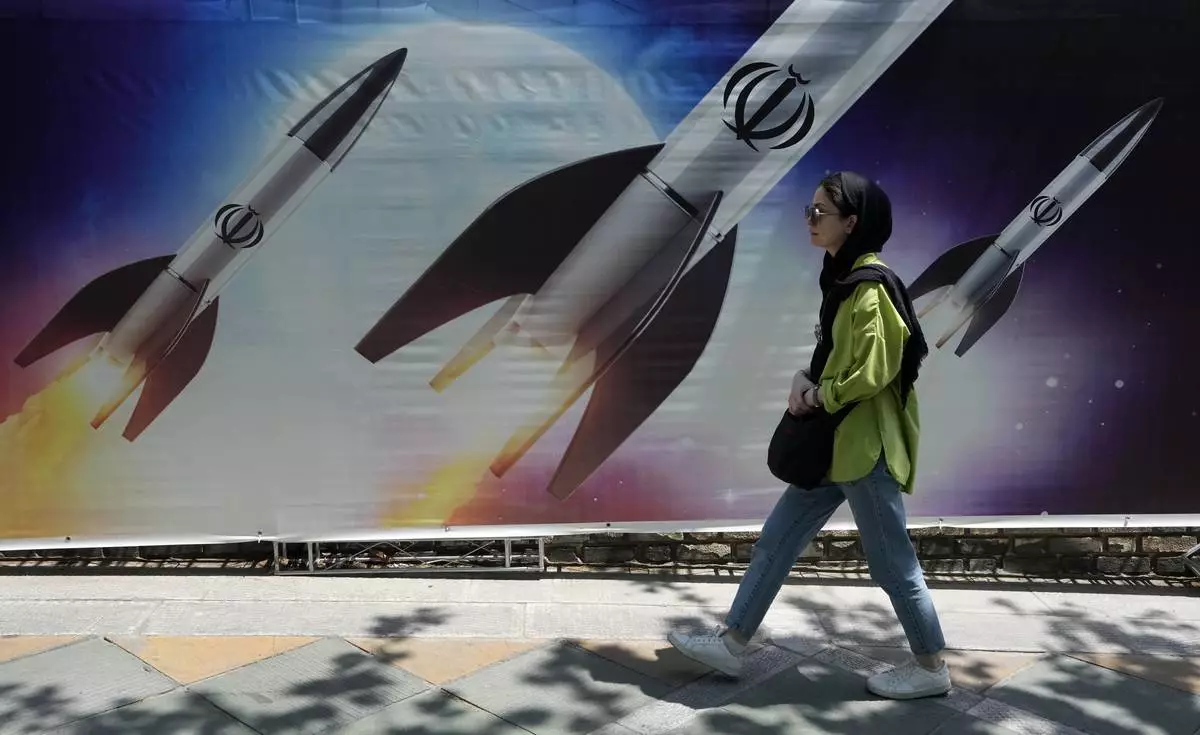
A woman walks past a banner showing missiles being launched, in northern Tehran, Iran, Friday, April 19, 2024. Iran fired air defenses at a major air base and a nuclear site near the central city of Isfahan after spotting drones early Friday morning, raising fears of a possible Israeli strike in retaliation for Tehran's unprecedented drone-and-missile assault on the country. On the missiles, a decorative sign reads: "Allah" (AP Photo/Vahid Salemi)
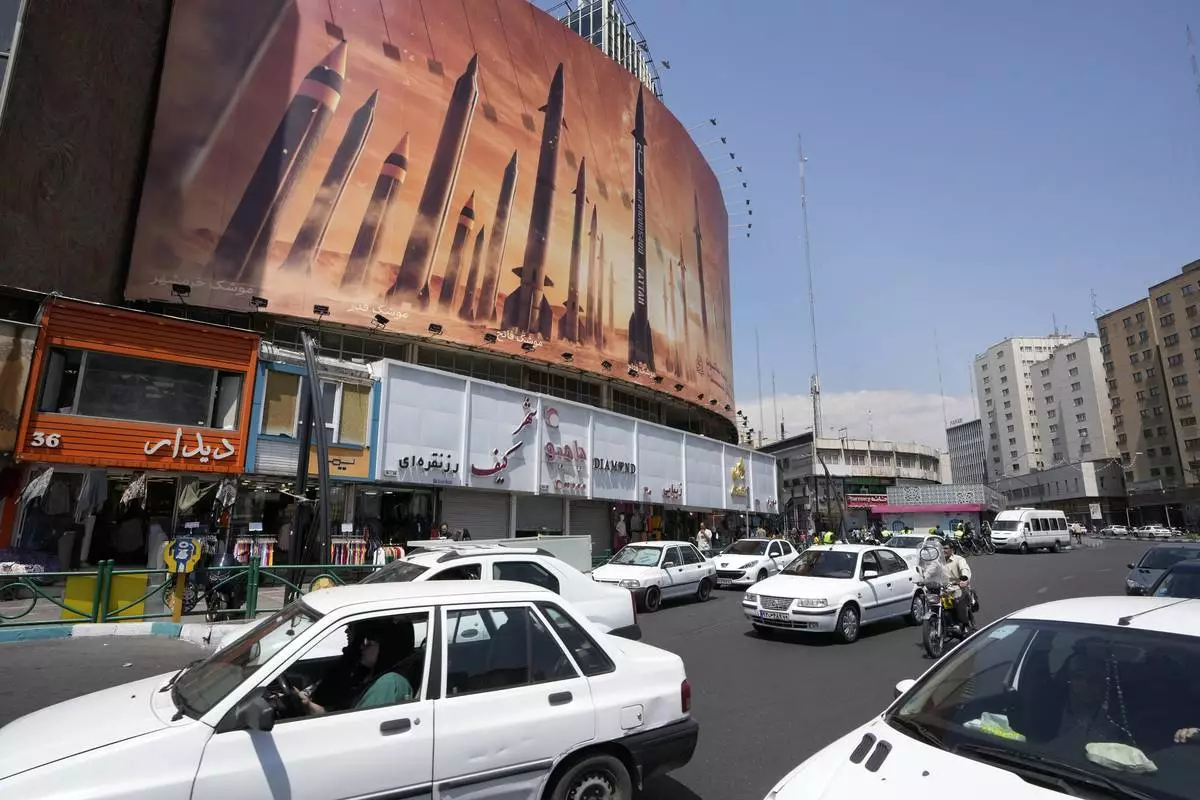
Vehicles drive past an anti-Israeli banner showing missiles being launched, in a square in downtown Tehran, Iran, Friday, April 19, 2024. Iran fired air defenses at a major air base and a nuclear site near the central city of Isfahan after spotting drones early Friday morning, raising fears of a possible Israeli strike in retaliation for Tehran's unprecedented drone-and-missile assault on the country. (AP Photo/Vahid Salemi)
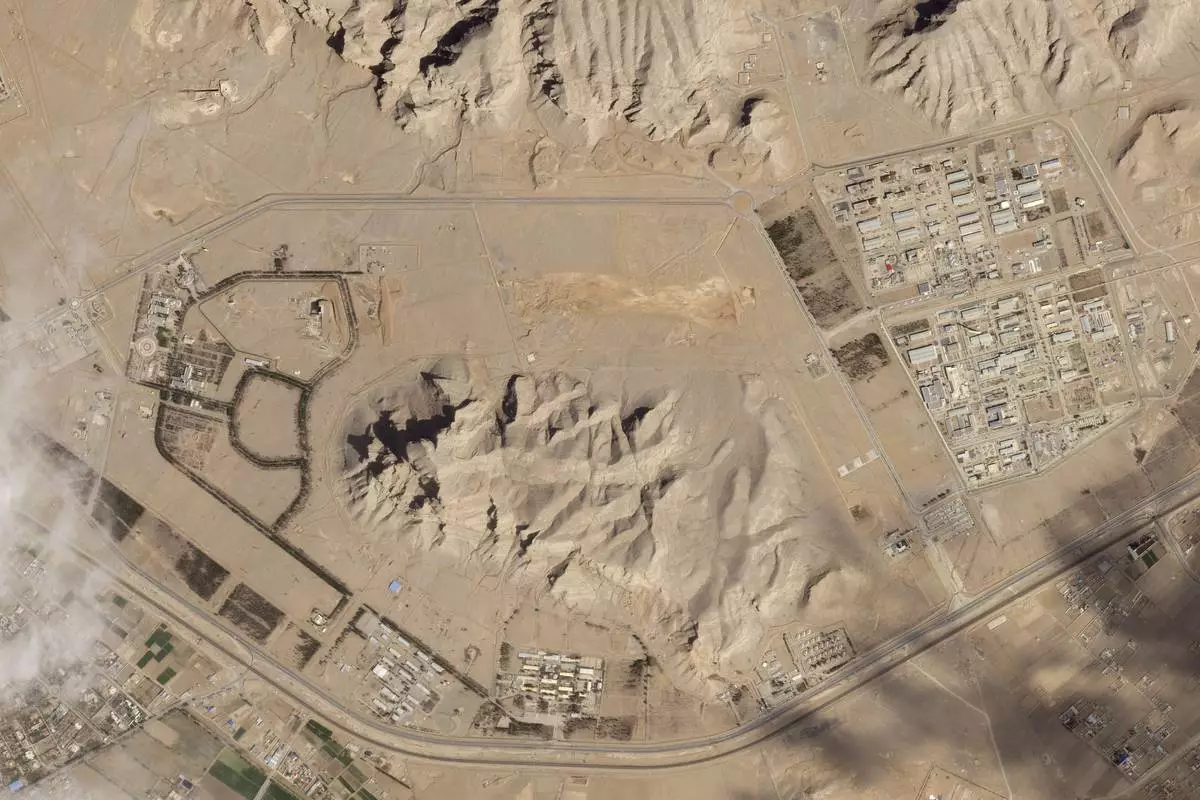
This satellite image from Planet Labs PBC shows Iran's nuclear site in Isfahan, Iran, April 4, 2024. Iran fired air defenses at a major air base and a nuclear site early Friday morning near the central city of Isfahan after spotting drones, which were suspected to be part of an Israeli attack in retaliation for Tehran's unprecedented drone-and-missile assault on the country. (Planet Labs PBC via AP)
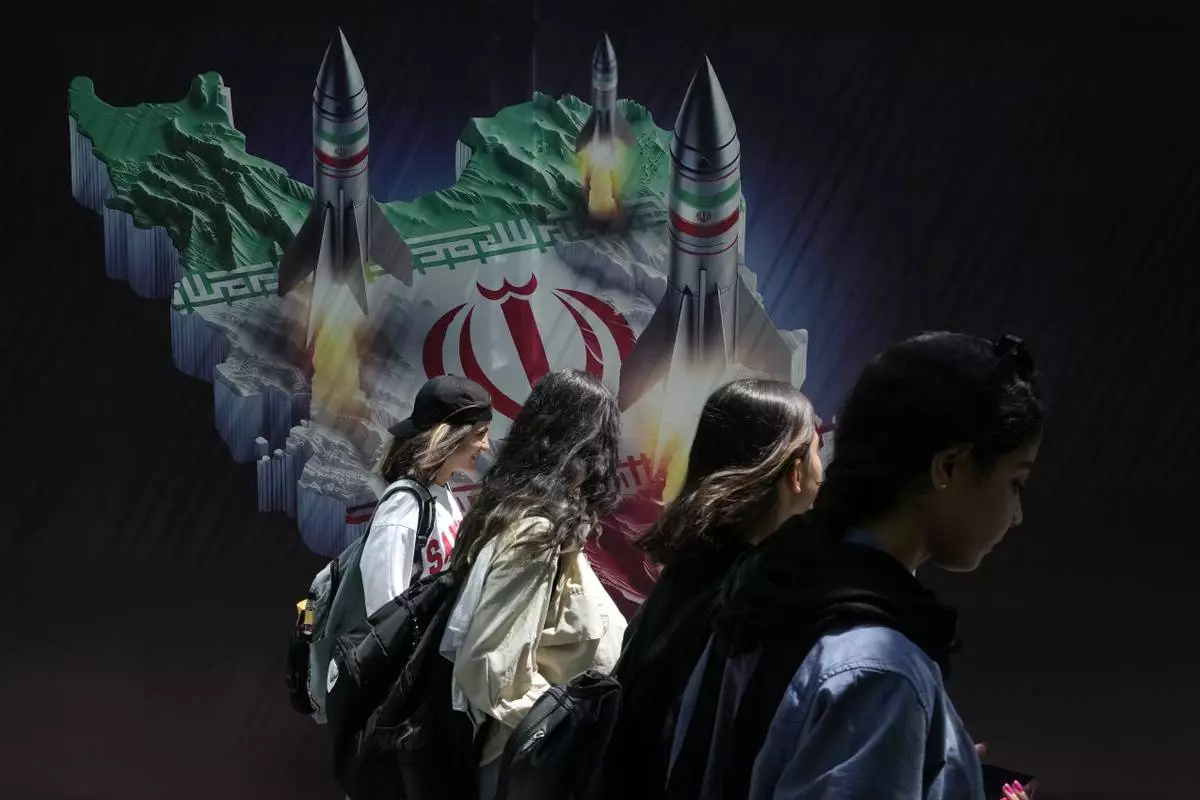
Iranian women without wearing their mandatory Islamic headscarf walk past a banner showing missiles being launched from Iranian map in northern Tehran, Iran, Friday, April 19, 2024. Iran fired air defenses at a major air base and a nuclear site near the central city of Isfahan after spotting drones early Friday morning, raising fears of a possible Israeli strike in retaliation for Tehran's unprecedented drone-and-missile assault on the country. (AP Photo/Vahid Salemi)















